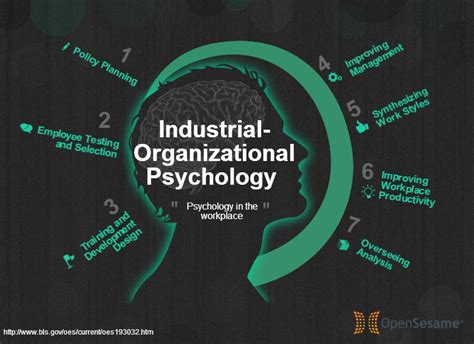Are you interested in the field of Industrial and Organizational Psychology and considering pursuing a program in this exciting and growing field? Industrial and Organizational Psychology is a branch of psychology that focuses on understanding human behavior in the workplace and applying psychological principles to improve organizations’ effectiveness and employees’ well-being. In this blog post, we will delve into the world of Industrial and Organizational Psychology programs offered at universities in the United States. We will explore the benefits of pursuing such a program, the curriculum and course structure, internship and research opportunities, as well as career paths and job prospects for graduates. Additionally, we will provide an overview of the top universities offering Industrial and Organizational Psychology programs, insight into networking and professional development opportunities, and hear from current students about their experiences in these programs. Whether you are a prospective student or simply curious about this field, this blog post will provide valuable information to help you shape your future in Industrial and Organizational Psychology.
Table of Contents
Understanding Industrial and Organizational Psychology
Industrial and Organizational Psychology, often referred to as I-O Psychology, is a field of study that focuses on understanding human behavior in the workplace. This branch of psychology applies principles and techniques to improve the overall well-being and performance of employees and organizations. It involves studying various aspects such as employee morale, job satisfaction, productivity, leadership, and organizational behavior.
One key focus of Industrial and Organizational Psychology is to optimize the workplace environment in order to enhance efficiency and effectiveness. This includes areas such as job analysis, performance appraisal, training and development, and work motivation. By understanding individual and group dynamics within an organization, professionals in this field are able to implement strategies that lead to positive outcomes for both employees and employers.
Furthermore, Industrial and Organizational Psychology plays a vital role in addressing workplace issues such as diversity, discrimination, and work-life balance. It aims to create a harmonious and inclusive work environment where each individual feels valued and respected. This not only contributes to a healthier organizational culture but also leads to better employee engagement and retention.
Overall, having a strong understanding of Industrial and Organizational Psychology is essential for anyone working in a professional setting. It provides valuable insights into human behavior, organizational dynamics, and best practices for creating a positive and productive work environment.
Benefits of Pursuing an Industrial and Organizational Psychology Program
One of the benefits of pursuing an industrial and organizational psychology program is the versatility it offers in terms of career options. Graduates of this program are equipped with a wide range of skills that are applicable to various industries and organizations, making them highly sought after in the job market.
Another benefit is the opportunity to make a meaningful impact in the workplace. Industrial and organizational psychologists are able to use their knowledge and expertise to improve employee satisfaction, productivity, and overall organizational effectiveness, ultimately contributing to a healthier and more successful work environment.
Furthermore, pursuing a program in industrial and organizational psychology allows individuals to gain a deep understanding of human behavior and performance in the workplace. This knowledge can be applied to address issues such as workplace diversity, leadership development, and employee motivation, leading to positive changes within organizations.
Lastly, a major benefit of this program is the potential for personal and professional growth. Through coursework, research, and hands-on experiences, students in industrial and organizational psychology programs have the opportunity to develop valuable skills in critical thinking, communication, and data analysis, which are all highly transferable and in-demand in today’s job market.
Overview of Industrial and Organizational Psychology Programs
Industrial and Organizational Psychology Programs are designed to provide students with a comprehensive understanding of the principles and practices that govern the behavior of individuals and groups in the workplace. These programs focus on applying psychological theories and research methodologies to address various challenges and issues faced by organizations and employees.
Students enrolled in Industrial and Organizational Psychology Programs will gain a deep understanding of topics such as employee motivation, leadership development, group dynamics, job satisfaction, and organizational culture. The curriculum is designed to equip students with the knowledge and skills necessary to assess and improve workplace effectiveness and employee well-being.
Furthermore, Industrial and Organizational Psychology Programs often include courses on research methods, statistics, organizational behavior, human resource management, and ethics. Students have the opportunity to engage in hands-on research projects and internships, allowing them to gain practical experience in the field.
Overall, Industrial and Organizational Psychology Programs offer a comprehensive and multidisciplinary approach to understanding and addressing various organizational and workplace issues, making them a valuable and rewarding field of study for aspiring psychologists and human resources professionals.
Top Universities Offering Industrial and Organizational Psychology Programs
When it comes to pursuing a degree in Industrial and Organizational Psychology, choosing the right university is crucial for your academic and professional success. Fortunately, there are several top universities across the globe that offer exceptional programs in this field.
One such institution is Stanford University, known for its cutting-edge research and comprehensive curriculum in Industrial and Organizational Psychology. The university boasts a diverse faculty with expertise in various areas of I/O Psychology, providing students with invaluable mentorship and guidance.
Another esteemed institution offering a top-notch I/O Psychology program is the University of Michigan. With a strong emphasis on practical training and experiential learning, the university equips students with the skills and knowledge needed to excel in the field.
Additionally, Harvard University is renowned for its rigorous I/O Psychology program, blending theoretical foundations with hands-on research opportunities. Students at Harvard have access to a wide range of resources and networking opportunities, preparing them for successful careers in the field.
Curriculum and Course Structure in Industrial and Organizational Psychology Programs
When pursuing a program in Industrial and Organizational Psychology, it is important to have a clear understanding of the curriculum and course structure. This field of study involves a unique blend of psychology and business, focusing on improving workplace productivity and employee satisfaction.
The curriculum typically includes courses in psychological theories, research methods, organizational behavior, human resource management, and statistical analysis. Students are also exposed to topics such as employee training and development, performance appraisal, motivation, leadership, and work-life balance.
Furthermore, the course structure often incorporates practical applications through case studies, simulations, and hands-on projects. This allows students to gain real-world experience and apply theoretical knowledge to actual workplace scenarios. Additionally, many programs offer opportunities for internships and research projects, providing valuable experiential learning.
Overall, the curriculum and course structure in Industrial and Organizational Psychology programs are designed to equip students with the skills and knowledge needed to address complex organizational challenges and drive positive change in the workplace.
Internship and Research Opportunities in Industrial and Organizational Psychology Programs
Internship and research opportunities play a crucial role in the development and growth of students pursuing a degree in Industrial and Organizational Psychology. These hands-on experiences allow students to apply their theoretical knowledge in real-world settings, gaining valuable practical skills and insights.
One of the benefits of participating in an internship as part of an Industrial and Organizational Psychology program is the opportunity to network and build connections within the industry. This can open doors to future employment opportunities and provide students with a deeper understanding of the professional landscape.
Research opportunities within these programs also allow students to delve into specific areas of interest within the field, contributing to the advancement of knowledge and understanding in the discipline. Whether it’s conducting surveys, analyzing data, or collaborating on research projects, these experiences can greatly enhance a student’s academic and professional profile.
Furthermore, internships and research opportunities can also serve as a platform for students to explore different career paths within Industrial and Organizational Psychology, helping them make informed decisions about their future endeavors. Overall, these opportunities are an integral part of the learning journey for students in these programs.
Career Paths and Job Prospects for Industrial and Organizational Psychology Graduates
Industrial and Organizational Psychology graduates have a wide range of career paths and job prospects available to them. With a strong understanding of human behavior and organizational dynamics, these graduates are well-equipped to pursue opportunities in a variety of industries.
Many graduates choose to work in human resources, where they can apply their knowledge of psychology to recruitment, training, and employee development. Others may opt for roles in management consulting, using their expertise to help organizations improve their overall effectiveness and productivity.
Some graduates may also find success in roles focused on talent management, organizational development, or employee engagement. Additionally, there are opportunities in academia and research for those interested in furthering the field of industrial and organizational psychology.
Overall, the diverse skill set and knowledge gained from an industrial and organizational psychology program can lead to fulfilling and impactful careers in various sectors.
Networking and Professional Development in Industrial and Organizational Psychology Programs
Networking and professional development are crucial components of industrial and organizational psychology programs. Networking allows students to connect with professionals in the field, potential employers, and other students who share similar career interests. It provides opportunities to learn about the latest trends and advancements in the industry, as well as to seek mentorship from experienced professionals.
Moreover, professional development activities, such as workshops, seminars, and conferences, help students enhance their skills, stay updated with industry standards, and build a strong professional identity. These activities also provide a platform for students to present their research, gain feedback, and establish themselves as experts in the field.
Many industrial and organizational psychology programs offer mentoring programs and alumni networks to facilitate networking and professional development. These platforms connect current students with successful alumni and industry leaders, allowing them to gain valuable insights and guidance for their careers.
In conclusion, networking and professional development play a vital role in the growth and success of aspiring industrial and organizational psychologists. Students should actively participate in these activities to build a strong professional network, stay updated with industry developments, and enhance their skills for a successful career in the field.
Faculty and Expertise in Industrial and Organizational Psychology Programs
When choosing a program in industrial and organizational psychology, it’s important to consider the faculty and their expertise in the field. The faculty members play a crucial role in shaping the educational experience and providing mentorship to the students.
At top universities offering industrial and organizational psychology programs, the faculty are often experts in various areas such as organizational behavior, human resource management, leadership, and job satisfaction. Their expertise and research contributions can have a significant impact on the quality of education and provide students with valuable insights and knowledge.
Students can benefit from learning from faculty members with diverse backgrounds and experiences, as it can provide them with a well-rounded understanding of the field. The expertise of the faculty also opens up opportunities for students to engage in research projects and gain practical insights into real-world applications of industrial and organizational psychology.
Ultimately, the faculty and their expertise are an integral part of the industrial and organizational psychology program, and students should carefully consider the faculty members and their areas of expertise when selecting a program to ensure a fulfilling educational experience.
Student Experiences and Testimonials in Industrial and Organizational Psychology Programs
One of the most valuable aspects of pursuing a degree in Industrial and Organizational Psychology is the opportunity to learn from the experiences and testimonials of current and former students. Hearing firsthand accounts of the program can provide invaluable insight into what to expect and how to make the most of the educational experience.
By learning about the experiences of other students, prospective students can gain a better understanding of the coursework, internships, and research opportunities available in the program. They can also gain insight into the professional development and networking opportunities that the program offers, as well as the career paths and job prospects that are available to graduates.
Student testimonials can provide a real-life perspective on what it’s like to be a part of an Industrial and Organizational Psychology program, and can help prospective students decide if the program is the right fit for them. Additionally, hearing success stories and learning from the challenges that others have faced can be motivating and inspiring for those considering a similar path.
Overall, student experiences and testimonials serve as an important resource for those considering a degree in Industrial and Organizational Psychology, providing valuable insight and guidance as they make important decisions about their educational and professional futures.






